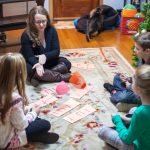Musical Life Podcast
We believe in providing a comprehensive musical education. Our private music lessons incorporate sight-reading, ear-training, music history, musicianship, musicality, and proper technique. If you’re ready for your musical journey get started today!
Musical Life Podcast: Episode 2 Practice Makes Perfect
“Practice makes perfect. Practice makes perfect. Practice makes perfect.” Everyone knows you should practice. We don’t need to be perfect though. Perfection doesn’t exist. We can polish something, but it will never be perfect. What we do want to recognize is the process and the journey of music. Everything we do in life requires learning, practice, and sharing. Music education is the same. It’s hard, sometimes tiring, but eventually joyful. Eventually we are excited to share what we know. We are able to share because we learned and practiced.
Practice is boring, just like studying. Why do we study? We study to pass a test or get a good grade. Why do we take the class? We take the class because we’re required to, but eventually we chose to take classes. We choose projects. We make a choice to build and create something. Then we have to learn how to do it. Studying is the hard part, but the process, the journey, the experience, and the result gives us the joy to forget the hard parts and repeat. Eventually it gets easier to study and learn new things. Eventually we look for more opportunities to learn something new or build something. Basic examples are building a new fence for your yard so your kids or pets don’t run away, fixing the dishwasher so you don’t have to buy a new one, sewing a hole in your clothes, making a new recipe, the list is endless.
Practice. The constant struggle for music teachers, students, and parents. The music teacher wants the students to practice everyday to master everything they have learned the previous week so they can polish the music and create more music together. There is nothing more exciting for a music teacher than working with a quickly advancing student. It’s so amazing to be a part of the development of new musicians. When a student finally does all the notes, rhythms, dynamics, articulation, and mood of the piece, you just want to dance and scream, “YES!”
The student just wants to play. If they are young, they just want to play games and have fun. If they are older, they just want to sit down and play the songs they know. They don’t like the hard part, the learning part. No one likes the learning part. That’s the time that you make a lot of mistakes. That’s the time when you have to give extra effort to build new skills. It’s exhausting to learn something new. It takes confidence to handle the mistakes and corrections so that we’re not taking mistakes as a reflection of our own self worth, but an opportunity to learn.
The parents just want their kids to practice like they’re told. They want to see a return on their investment. They want to be sure the money they are spending is worth it. They are tired. Parents are tired of shuffling kids to and from activities. Parents are tired of nagging their kids to practice. Parents just want a break. Can their children just happily practice and go to their lessons? Some parents use the incentive motivator. Stickers, reward jars, etc are a great option for building the practice habit. We’ve used a pom-pom jar in our own house, with much success. For the basic practice they receive 1 pom-pom. For the extra cooperation, motivation, and hard work, they receive 2 pom-poms. Once their jar is filled, they can pick out a prize. This visual helps remind students of what they have accomplished. Rewards work on students of all ages. Once students are practicing regularly, the rewards are no longer required, but reinforce the work. Eventually the finished musical piece is the reward.
The struggles are real. Real practice struggles exist for most families. These are not a reflection of lack of interest or enthusiasm. How many parents remember taking piano lessons for a few years, quitting, and now wish they still played? So many parents tell me this. At least 50% wish they had never quit and still played. There are some students that just click with music and practice all the time. However, most students require goals, coaxing, rewards, and sometimes, bribing to get them to practice. I want to change the conversation from practice to sharing. Sharing is what we all naturally do once we master a skill. A parent needs to learn how to braid their child’s hair. Enter the learning stage. After watching others in person or youtube several times, that parent is ready for the practice. The first few braids are a little bumpy, but eventually they are looking pretty good. A few months or years later, your child wants to learn how to braid hair. Now you share your skill. The sharing is the fun part. What if we reframe the practice to feel like the sharing? Sharing can be formal on a fancy stage, semi-formal at an outside venue, or casual at home with family. Instead of making it a battle, make it a shared experience. Families can have mini performances at home with their children. Siblings can do pretend recitals. Family members can create a miniature band combining what they have learned from lessons into a new experience. Try making it a shared experience at home and everyone will see better results. Showing an interest in what your child did will be an even better motivation for everyone. Just say “Show me what you worked on.” Make it an enjoyable experience for everyone.
Setting goals is an incredible motivator for practicing. If it’s just daily or weekly practice goals, it can be difficult to stay interested. It’s so easy to take the easy way out and skip practicing for TV or device time. Once you have a weekly practice goal set up, register for a recital, adjudicated event, or casual performance. While these might be intimidating, they will also teach important life lessons and give the student that extra reason to stick to the practice schedule. Pick rewards. Once you set your practice goals, choose a reward for keeping that schedule. We use the pom-pom jar. Those pom-poms convert to money so the kids can pick out things that they want from stores or snacks when we’re out. Those extra things that kids are always asking for, but parents always say no to. Use the reward jar for those! Then you get to say yes, and your kids are doing what they are supposed to do!
I also notice an increase in ease to get the kids to practice when we have a routine. If we’re practicing every day right after school, it becomes a habit for them. Then those weeks where everything gets thrown off, we struggle to get them back on track. You can use the rewards to develop and reinforce routines. Eventually, you won’t need the rewards to practice. It will become a habit. Think of all the rest of our habits like sleep, meals, getting ready for the day, etc. These are things that we do everyday, without thinking. Once we develop a routine or habit, it becomes easier to learn new things, because we don’t have to make a decision. One decision is already made for us. In a world full of microdecisions via text, email, and social media. How simple would it be to just do without thinking? Charles Duhigg explains how this works in his book, The Power of Habit. I highly recommend reading or listening to this book for more information about habits.
Students, teachers, and parents struggle with practice motivation. Many students never practice. Some parents patiently wait for their children to practice and others give up and cancel lessons all together. The skills you need for music education are the same in life. Learning, practice, and sharing are used every day in every aspect of life. Learning and practice is hard and frustrating, but if we continue doing the hard things, we can get to the sharing and the fun things. It’s fun to show friends and family things we have accomplished. Understanding this process can help families understand the lifelong skills they are building through music education and better assist their students through the process. Sometimes rewards are needed to build practice habits. Sometimes reframing the practice into a game or a family activity assists the students in a more agreeable experience at home. The key is to remember that music is a life-long journey. Each student’s journey is different, but valued. Recognizing the journey will help you develop a balanced life. Find the tools that work best for you. Some families can practice every day, some can only practice once a week, and some can’t practice between lessons. Some families use stickers and pom-poms to motivate practice. Others make it a shared experience together at home. What’s important is to remember that it’s a life-long journey and experience. When we change our mindset from nagging to sharing, from practicing everyday to sharing our musical experiences, we will see better results.
Practice Tips
Make It A Game
Let’s play piano lesson or piano recital. I’ll be the teacher and you can be the student. Then we can take turns and switch. Have the student teach the parent how to play the song. Purposely play the song wrong and ask the student to find the mistakes.
Make it a Routine
Every day after school or after dinner. Practice during the week and take the weekend off. Practice over the weekend and take the week off.
Set Practice Goals
Every day after school or after dinner. Practice during the week and take the weekend off. Practice over the weekend and take the week off.
Thank You & Free PDF
There is a free pdf of a practice sheet included in the show notes. Complimentary of one of our fabulous teachers, Miss Laurie. I do need to take minute to also thank her for being the wonderful human being that she is. Miss Laurie was part of a team of teachers that I acquired with the second location of Chambers Music Studio, our sponsor. She is a wonderfully warm teacher with a lot of experience, but continues to learn and practice. She knows that as teachers and humans, we are always learning. Miss Laurie is also incredibly supportive, nurturing, and grateful, but also not afraid to truthfully point out problems that need to be addressed. I am thankful to have her on the team! Thank you so much Laurie!
Are You Ready To Continue Your Musical Journey?
Whether you’re a modern Mozart or just starting to explore the world of music, our music lessons are designed to nurture your individual skills and interests. We aim to make learning music enjoyable and rewarding, no matter where you start on the musical spectrum.







